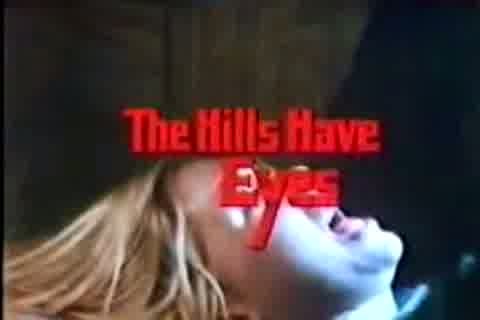Director:
Wes CravenGuión:
Wes CravenCámara:
Eric SaarinenMúsica:
Don PeakeReparto:
Suze Lanier-Bramlett, Robert Houston, Martin Speer, Dee Wallace, Russ Grieve, John Steadman, Virginia Vincent, Michael Berryman, Lance Gordon, Peter Locke (más)Streaming (1)
Sinopsis(1)
Camino de California, una típica família de clase media norteamericana sufre una avería en medio del desierto. A partir de ese momento, el viaje se tornará un calvario para ellos, intentando sobrevivir a una siniestra familia de caníbales... (Cinema 2000)
Reseñas (6)
Respuesta de Wes Craven a La matanza de Texas. Pero una clase más débil. Mientras que su escenario desértico es igualmente angustioso, y la extraña música de sintetizador le da la capa justa de espeluznante, la familia de caníbales son sólo un montón de bufones miserables, y no encarnan en absoluto el naturalismo cauteloso y lo suficientemente creíble de los Chainsaw. Los vemos aleatoriamente durante el día, la noche y en situaciones en las que solo son una parodia divertida. Las escenas en torno a su guarida y su propia madre con un penacho indio recuerdan a Furia apache. El primer tercio de la película es realmente genial en términos de atmósfera y crueldad.
()
Five years passed between the release of Wes Craven’s directorial debut, the still disturbing The Last House on the Left, and his second film. As with that earlier film, he not only directed The Hills Have Eyes, but also wrote the screenplay and did the editing himself. The plot couldn’t be any simpler: the American middle class is confronted in the middle of the desert with something whose existence is not acknowledged in the safety of the home. A family of Republicans (their political leanings are apparent from their warm relationship with guns and hypocritical faith in God) is about to become intimately familiar with a family of degenerate cannibals. The film is notably less intense and disturbing than the thematically similar The Texas Chainsaw Massacre. What I miss is especially the dinginess of Hooper’s cult hixploitation flick; in the best case, even the cannibals here look like a gang of bandits from a television fairy-tale for kids. They don’t arouse fear and we don’t see much of the violence that they carry out. Because there is nothing to be afraid of, The Hills Have Eyes works better as “mirror held up to society” than as a horror film eliciting a feeling of dread. It is worth noting that Craven didn’t employ the usual division between technological and pre-technological societies, as the savages also use modern technology; they have simply learned to control the achievements of civilisation, regardless of how uncivilised they are themselves. Furthermore, in their use of technology, they achieve better results than the protagonists, who are repeatedly let down by otherwise reliable gadgets, mostly at the moment when they want to kill someone with them. They manage to get the killing done only by using more barbaric means (an axe, a dagger) requiring hand-to-hand combat. In other words, if you want to survive in the wilderness, you have to become a savage yourself. This psychologically dense (the loss of the father, the mother’s fear of snakes, Pluto’s frustration from being denied sex) film ends at the moment the monster inside of us is revealed, at the moment of the direct attack on the camera. There is no epilogue that would restore the status quo. Deal with it the best you can, dear viewer. Deprived of a sense of security like the whole family in the film, we are the main victim. Very unsettling, very Craven. 65%
()
Aja’s remake is so good, that (given its the average rating) I ignored Craven’s original for a pretty long time. Which was a mistake, it’s a surprisingly good horror flick. If there’s something that elevates it above the remake are the redneck cannibals, here they differ both in appearance and character, so they are proper characters instead just murder machines, as in the modern version. And they look so prehistorical, like Neanderthals, I loved it. For one hour, the film is basically excellent – atmospheric, brutal, terrifying. It’s a pity then that the third act slides into a relatively boring massacre, and in daylight to boot. So the final impression is a bit lower, but overall, almost unexpected satisfaction.
()
If Craven had done one thing better and set the communicativeness solely on the level of the victims, this could have been one of the best horror films of the 1970s. This way, what remains is an experience of a hopelessness and assorted murders, but degraded by the frequent depiction of a ridiculous cannibal family and their demented dialogue. Fortunately, at least Alexander Aja's remake successfully eliminated almost all the shortcomings.
()
Craven’s sadistic view on how a family vacation might go wrong. I cannot imagine how shocking this film must have been at the time of its release. It is still shocking today, for that matter.
()
Naive townies versus cannibal savages in the California desert. The former search for an inherited silver mine and get stuck there, the latter live there. The film is about the struggle of two different families, one killing to survive and the other to eat and thus actually survive. Later on, it turns out that the urban family is not so different from the savage one when it is cut off from civilization and modern technology. In order for the townspeople to stand up to the savages in the wilderness, they must also become savages. You can see a kind of social commentary in this, or just an insane B-movie killing spree, that's up to you. Wes Craven is great at evoking the atmosphere of an inhospitable wilderness, but the film is more likely to be recommended only to fans of cinematic perversions, Craven and the bald dude Michael Berryman.
()

